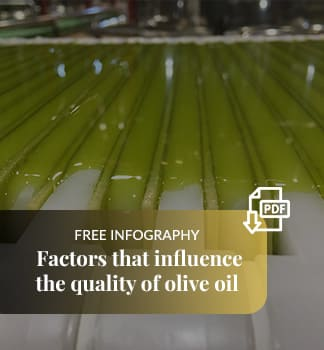Being a taster of Extra Virgin Olive Oil (EVOO) is a question, more related to interest and persistence than to the innate abilities of a person or the famous “gift” with which one is born. This statement is what we intend to develop throughout this article, where we are going to explain how to be an olive oil taster, one of the most important issues for the olive oil sector.
Sometimes we can think that to be an olive oil taster you have to have particular or special characteristics. This is important, but it needs to be accompanied by a series of other issues, without which you won't be able to become a good taster.
We are going to see 9 of the main requirements that a good virgin olive oil taster must have:
Training
First of all, to be an oil taster, you have to be trained in the positive and negative attributes of virgin olive oil. That is, being trained and knowing what are the descriptors or positive aromas and what are the defects or attributes and negative aromas. If you do not have this training, it is not possible to evaluate virgin olive oil samples.
As in all matters, training, the higher quality it has, the greater your knowledge and the easier the training will be later.
ESAO olive oil tasting . ESAO image bank
Persistence
Persistence and continuous training is the best and most reliable tool to be an oil taster. Once you have trained, you have to continue tasting assiduously. It is not useful to taste some oil from time to time or sporadically, but you have to taste it continuously.
An official panel, for example, will taste weekly. One day a week they will meet in the panel to evaluate and classify the virgin olive oil samples that come to them.
The training can be done both at home and on the panel.
ESAO olive oil tasting session. ESAO image bank
Normally the usual thing is that you train at home or at your workplace, since on the panel you need time to travel, as well as rigorous assistance and this entails two great added difficulties.
To enter a tasting panel, the entry requirements are high, because you have to make sure that the panelist candidate meets a series of requirements and above all ensure its continuity over time, since it is very expensive to train and train a taster so that after this he is an unstable person or does not attend training.
If you are interested in having a regular tasting training, check out the ESAO MACA program, as this program helps you train from home.
Variety in the samples
It is important that in this training, the samples are different. By this I mean that it does not work if you always taste or taste the same oil or that it is always the oil that you produce, buy or consume.
You have to get used to the different varieties of olives, as well as different ways of processing. You have to taste both extra early virgin olive oils, as well as virgin or extra virgin olive oils.
To be an olive oil taster you have to be used to having different samples and knowing how to interpret them, and above all not to judge if you do not have specific knowledge of the sample in question.
Different EVOO and EVO samples. ESAO image bank
Memory
You have to have memory. It will be useless if I study and train but I am not concentrated and I am not able to integrate and record aromas and flavors.
The aromas and flavors will be those that tell me which sample I am in front of and how to classify a virgin olive oil. I have to work on repeatability in my results. Not only do I have to detect a defect, but I have to know what specific defect it is, I have to give it its name and memory plays a great role for this.
Olive Oil taster. ESAO image bank
However, we all know that memory is a quality of the individual that will have to a greater or lesser extent depending on the time spent developing it. It is true that some people will need more time than others to develop it but in the end it is a matter of time and effort.
Time availability
Related to the above requirements, time is one of the essential requirements to be a virgin olive oil taster. Many tasters have ceased to be, simply due to lack of time. You cannot, for example, attend a panel and be absent every time an unforeseen event arises. Tasting appointments must be a priority if you want to be a taster.
EVOO tasting session at ESAO. ESAO image bank
Like it or not, you have to have time available to dedicate to the tasting, to be focused and to be able to reliably evaluate your oil samples. When you go to taste, it is not about taking a bottle, uncapping it and sticking it to your nose. What's more, this practice is totally discouraged.
It is about analyzing and evaluating a virgin olive oil sample, knowing what classification we are talking about and mainly evaluating whether or not it has defects. This time of tasting, it is independent that you do it at home, in a panel, in the oil mill, in your workplace, etc. The important thing is to dedicate the time you need.
Discipline
An essential characteristic of a good taster is discipline.
Apart from that constant training is so important for a taster, trying to carry out the tasting always in the same place, like trying to take care of the environment that surrounds you, ensuring that it is always the same, as similar as possible, in order to achieve concentration, which is so important.
ESAO EVOO tasting session. ESAO image bank
We must bear in mind that when we want to taste an oil it is because we want to know the sample in front of us, what oil it is, what qualities it has, what defects it incorporates, and if it incorporates a defect we must try to recognize it. For this, concentration and discipline must be a priority.
In case of doubt about a sample, you have to be disciplined and ask your colleagues so that together they can see where the problem is or solve the doubt. In no case can we treat the sample in a banal way and without giving it the importance it has.
Modesty and Humility
One characteristic that only the best tasters have is modesty and humility. This on many occasions is what differentiates a taster from a good taster or an extraordinary taster.
In fact, we must remember that virgin olive oil samples, for their classification, must be evaluated by a tasting panel.
A tasting panel is a group of people who must be at least 8, and cannot be fewer in the case of official tasting panels. This means that the norm is clear that it rejects individual tasters in isolation, and requires that, in order to classify an oil, at least 8 tasters must be brought together and this is only so that the results can be jointly evaluated.
The head of the tasting panel will be the one who uses the information from all the tasters before issuing their report. This shows that an individual taster cannot in any case officially classify an olive oil.
Those tasters who believe that their opinion invalidates the rest are not good tasters.
Olive Oil Sommelier. ESAO image bank
Anonymity
Related to the previous one, anonymity is a characteristic of a taster. In principle, every good taster should prefer to have the maximum possible anonymity, since it will avoid all kinds of problems or pressure from producers.
Not always the results of a virgin olive oil sample, even though its physicochemical analysis is good, will coincide with the expected results of a producer. That is why anonymity will always be a characteristic desired by a good taster.
In fact, in the ESAO Awards competition, for example, the jury in charge of scoring the samples presented is a group of anonymous panel-trained tasters.
Open mind
Finally a good characteristic to be an olive oil taster is to have an open mind. We must know that virgin olive oil is living matter, it is pure nature, it is a juice of a fruit, in this case the olive.
This means that it evolves, and rapidly over time, while, if it is not accompanied by good conservation measures, it accelerates its physicochemical processes and all this is reflected in its organoleptic characteristics. Depending on the campaign, there will also be changes in olive oils, and this must be known and taken into account.
You have to listen to opinions different from ours and know exactly what the show is about. We must know that we never know or will never know all the existing varieties, since they are in continuous discovery, we must have an open mind to listen and analyze and later we will give our opinion.
To work with a product so related to nature you cannot have a closed or squared mind, since nature is diverse, dynamic, changing, but in the end, as one of the most repeated phrases says, nature is wise.
.png)


